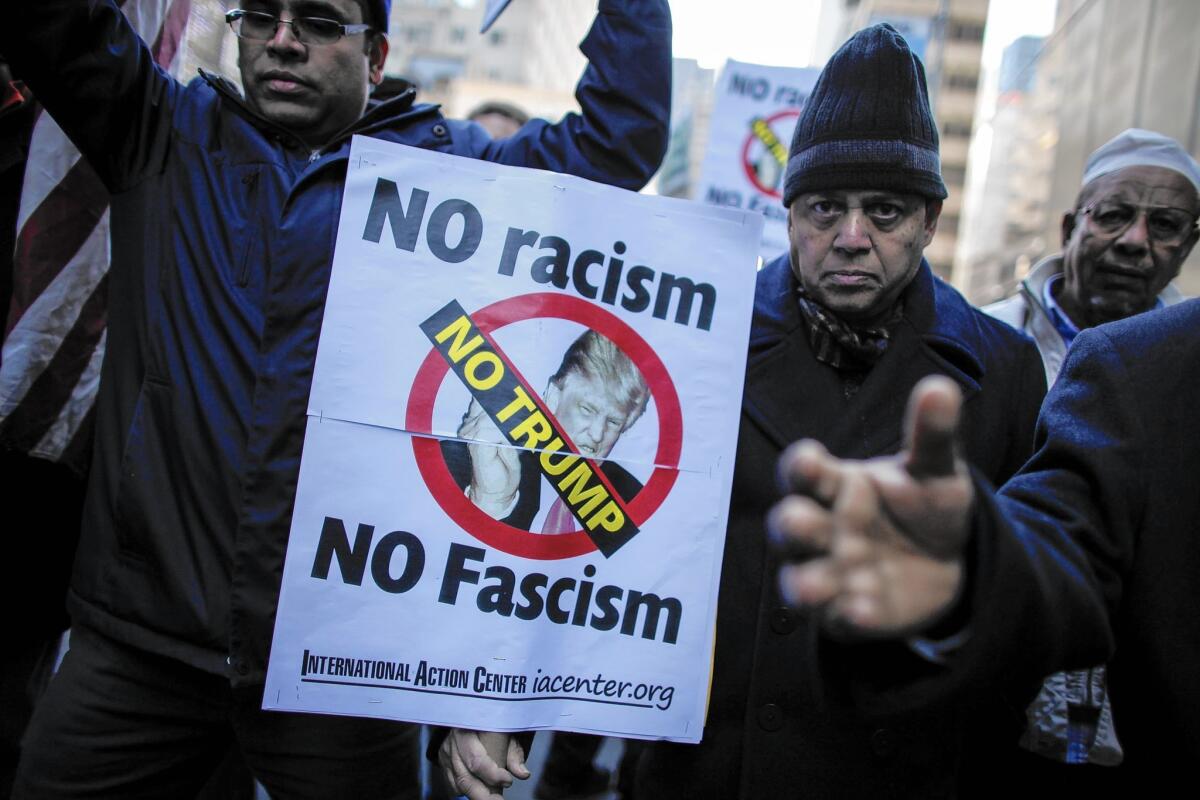How Trump’s comments on Muslims fit into the country’s history of religious demagoguery

- Share via
One night in 1834, renowned Presbyterian minister Lyman Beecher delivered a sermon in Boston railing against the “despotic character and hostile designs of popery upon our country.”
Not far away that night, a mob stormed an Ursuline Sisters convent and burned it to the ground.
It was never proved that the sermon incited the attack. Still, Lynn S. Neal, a religion professor at Wake Forest University, maintains that Beecher’s caustic rhetoric contributed to the violence by “weaponizing” the prevailing anti-Catholic bias.
Republican presidential hopeful Donald Trump’s proposal to bar Muslims from entering the United States has evoked comparisons to episodes in American history in which foreigners or adherents of an unfamiliar religion were stigmatized.
“The country has always sought out or promoted people who have voiced very loudly and provocatively ideas that seem to be completely counter to our notions of America: idealism, inclusion and e pluribus unum,” said Kenneth C. Davis, author of the popular “Don’t Know Much About” book series.
“We have a long strain in our political DNA of fearing people who are different — the other,” Davis said.
An extreme example cited by Neal is the infamous “Extermination Order” signed by Missouri Gov. Lilburn Boggs during the 1838 Mormon War.
It said that “the Mormons must be treated as enemies, and must be exterminated or driven from the state if necessary for the public peace — their outrages are beyond all description.”
Join the conversation on Facebook >>
The order stood for 138 years until it was rescinded with an apology by Gov. Christopher Bond in 1976.
Trump’s rhetoric toward Muslims has never approached Boggs’ anti-Mormon venom or Beecher’s anti-Catholic vituperations. Rather, he has been likened to two 20th century demagogues: Father Charles Coughlin, the Roman Catholic priest who vilified Jews on national radio broadcasts, and Sen. Joseph McCarthy of Wisconsin, who launched America on a communist witch hunt.
Such comparisons can be misleading, said Albert S. Lindemann, a professor emeritus of history at UC Santa Barbara who has studied anti-Semitism. Trump is “a man on a wild ego trip, without much ideology behind it,” he said.
Still, Ellen Schrecker, a history professor at Yeshiva University in New York and an expert on the McCarthy era, sees similarities between today’s attitudes toward Muslims and the communist scare fomented by the Wisconsin senator.
In the 1950s, she said, “people really did believe the guy next door was a communist. Now it’s much more of an ethnic thing…. You have a very opportunistic politician taking advantage of it, somebody who, like McCarthy, doesn’t quite understand limits.”
But Schrecker acknowledged a significant difference.
“The McCarthy period didn’t have terrorists going around the world shooting up places,” she said.
NEWSLETTER: Get the day’s top headlines from Times Editor Davan Maharaj >>
That very real danger invites comparisons to another episode in which the nation’s leaders took extraordinary measures to counter a perceived external threat.
In 1798, France was the worrisome “other” for the governing Federalists who suspected its immigrants of harboring secessionist and papist sentiments — and of being likely voters for the opposition Jeffersonians.
The Federalist administration pushed through the Alien and Sedition Acts, a package of laws giving President John Adams authority to deport or imprison “dangerous” immigrants and foreigners.
“The 1798 Alien Act looks like Donald Trump could have drafted it,” Davis said.
After the convictions under the Sedition Act of several newspaper publishers critical of the administration, public disdain for the laws contributed to Thomas Jefferson’s victory in the presidential election of 1800. The Sedition Act and the Alien Act, which allowed the deportation of any noncitizen adult deemed “dangerous to the peace and safety,” were allowed to expire.
But the Alien Enemies Act, which authorized the president to arrest or imprison any noncitizen from a country that had made or threatened an “invasion or predatory incursion” against the U.S., remains intact. It was invoked by President Franklin D. Roosevelt in ordering the internment of U.S. residents of Japanese origin during World War II.
Despite history’s judgment that this mass suspension of civil liberties was a shameful departure from American values, Trump has cited it as support for his own less draconian proposal regarding Muslims.
Invoking a wartime statute against followers of a specific religion could be viewed as an attempt to reconcile Trump’s rhetoric on Muslims with a deeply held American value, separation of church and state, said constitutional scholar Michael Dorf, a professor at Cornell University Law School.
“In effect, he’s saying that the U.S. is at war with Islam,” Dorf said.
That, he said, “is factually false and would, if assumed to be true, be disastrous policy.”
Even if Trump’s stance is not intrinsically about religion, said Neal, the Wake Forest scholar, he shares with past provocateurs “the view that they are ‘defending’ the United States by excluding a particular religion.
“There was religious intolerance toward Muslims before Trump’s statement,” Neal said. “But these recent statements, combined with his public power and influence, help create an environment in which religious intolerance toward Muslims becomes more acceptable.”
MORE ON DONALD TRUMP
New Hampshire voters weigh in on the appeal of Donald Trump
Fox News Channel will celebrate New Year’s Eve with Donald Trump
Donald Trump’s campaign: It’s less chaotic and more calculated than it looks
More to Read
Get the L.A. Times Politics newsletter
Deeply reported insights into legislation, politics and policy from Sacramento, Washington and beyond. In your inbox twice per week.
You may occasionally receive promotional content from the Los Angeles Times.











